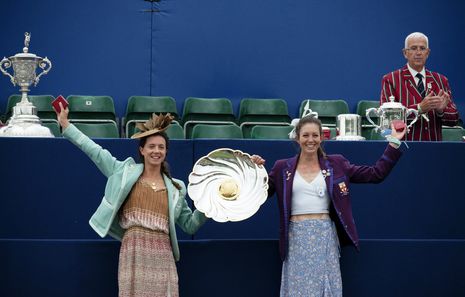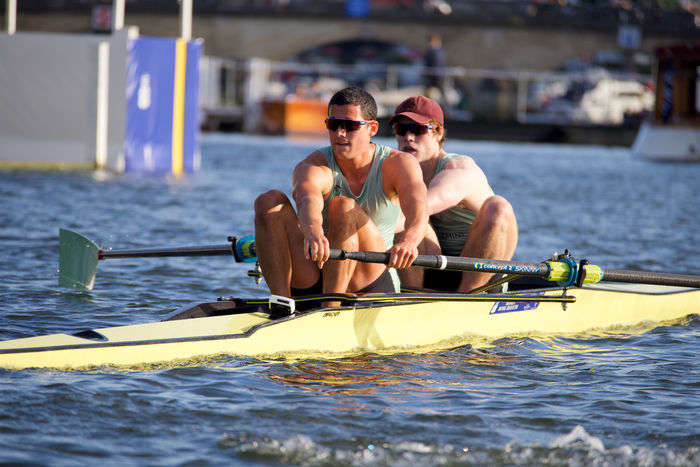Team GB’s Imogen Grant: “Gold at all costs is not a mentality that builds people to last”
Following last month’s Olympic journey and victory at Henley, Sports Editor Liam Kline speaks to the CUBC rower about gauging her personal success against the backdrop of British Rowing’s Tokyo disappointment

Joining Varsity’s Zoom call surrounded by walls lined with plaques of honour, Imogen Grant made herself at home in Cambridge University Boat Club’s (CUBC) Goldie Boathouse. Fresh off the toils of this year’s Tokyo Olympics and Henley Royal Regatta, she dives straight back into her medical studies at Trinity College, while also taking the time to contemplate her recent experiences in the rowing world.
Rewind to mid-August (15/08), Grant enjoyed success on the Thames with Team GB partner Emily Craig, winning the Stonor Challenge Trophy after beating Leander Club’s Jess Leyden and Georgie Brayshaw. Setting aside any feelings of fatigue following the Games, she explained that “it was just really fun and so nice to race in front of people again,” with spectators allowed to line the banks in a notable contrast to the empty venues of Japan. As Grant’s return to England coincided with a busy academic period for medicine students, however, she admitted: “I was very tired from lectures, but I knew it was just mental tiredness, and actually having the structure of going out rowing again was really nice.”
“ultimately it’s the rowers in the boats that have to control the controllables”
Shortly before Henley, Grant and Craig earned a fourth-placed finish at Tokyo in the Lightweight Women’s Double Sculls (29/07), cruelly missing out on a podium spot by a mere 0.01 seconds to Dutch duo Marieke Keijser and Ilse Paulis. Grant reflected on the outcome with poise: “Obviously I would love to be sitting here with a medal, but we pushed as hard as we could and didn’t make any mistakes. It was such a tight race that, if you’d have done it again, different people would probably cross the finish line first.” She added: “I think we dealt with everything as well as we possibly could, trained and raced as well as we possibly could, and if that was a fourth-placed finish by an inch then I guess that’s what we have to accept.”
The pair’s result comes in the context of an undeniably disappointing regatta for Team GB, totalling their worst medal return since the 1972 Munich Games, after claiming six fourth-placed finishes on the Sea Forest Waterway. Back in December last year, UK Sport confirmed that British Rowing would receive a funding reduction of around 10% for the Tokyo and Paris cycle due to the financial impact of the pandemic. However, this Olympic misfortune prompted UK Sport CEO Sally Munday to publicly defend even the post-reduction figure, insisting that “inspiration is as important as the medals.”
“I’ve managed to do rowing and academics before, and in a lot of ways I feel like it makes me a more rounded person”
On a similar note to Munday, Grant draws on the discussion of mental health that increasingly dominates the sporting scene: “With Simone Biles, Naomi Osaka, and lots of other individuals talking more about what it means to be successful and the metrics involved, I hope people can see that gold at all costs is not a mentality that builds people to last nor builds happy athletes either.” She continued: “Obviously there have been questions asked because people want to see medals, but we were just so close. If the wind had blown a different way, we’d be sitting here with eight medals and no one would be saying anything at all.”
Unfortunately, a large part of what has been said stems from Team GB’s own men’s eight team, who took bronze in their respective final. Following the outcome, crew member Josh Bugajski accused legendary coach Jürgen Gröbler of “destroying the souls” of those not in his favour. He went on: “I’m going to be brave and say something that the crew don’t want me to say. I cracked open a bottle of champagne when Jürgen retired.”
This self-inflicted backlash pervades the media and inevitably makes it difficult to distinguish Grant’s personal effort from the team’s underachievement: “It’s sometimes hard because there has been criticism of British Rowing and that makes me feel sad. I’d love to be sitting here with a medal to show everyone a physical manifestation of my success.” She further stated: “I can’t really comment on what other people might feel about their own performances and, of course, people are going to lump it together as one big team, but ultimately it’s the rowers in the boats that have to control the controllables.”
As the curtains close over this summer’s stage of international competition, Grant resumes her medical studies and expects to graduate in 2023, fittingly twelve months prior to the Paris Games: “It will all fit neatly together and will be great.” On the balancing act of work and sports, she recognises that “it’s not necessarily going to be easy, but I’ve managed to do rowing and academics before, and in a lot of ways I feel like it makes me a more rounded person because I’m excited about all facets of rowing.” Meanwhile, Grant emphasised the wider determination of British Rowing: “What I do know is that every single person who finished fourth is going to be hungry and really want a medal in Paris, so I’m really excited for this coming Olympiad.”
Putting aside the overall result of Team GB’s rowing cohort, Grant reaps the rewards of a fruitful few months in the shell and provides compelling insight into the intangible successes of an Olympic athlete. The Goldie Boathouse hosts a talented female rower that will undoubtedly continue to make great strides both on the water and in the hospital wards.
 News / Judge Business School advisor resigns over Epstein and Andrew links18 February 2026
News / Judge Business School advisor resigns over Epstein and Andrew links18 February 2026 News / Hundreds of Cambridge academics demand vote on fate of vet course20 February 2026
News / Hundreds of Cambridge academics demand vote on fate of vet course20 February 2026 News / Petition demands University reverse decision on vegan menu20 February 2026
News / Petition demands University reverse decision on vegan menu20 February 2026 News / CUCA members attend Reform rally in London20 February 2026
News / CUCA members attend Reform rally in London20 February 2026 News / Gov grants £36m to Cambridge supercomputer17 February 2026
News / Gov grants £36m to Cambridge supercomputer17 February 2026











